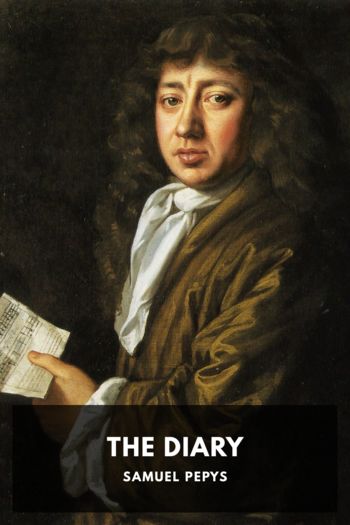The Diary, Samuel Pepys [e reader books TXT] 📗

- Author: Samuel Pepys
Book online «The Diary, Samuel Pepys [e reader books TXT] 📗». Author Samuel Pepys
↩
“Dec. 12, 1667. Between twelve and one of the clock, the paper called The Humble Petition and Address of Edward, Earl of Clarendon, directed to the Lords Spiritual and Temporal in Parliament assembled, was, according to a late order of Parliament, burnt by the hands of the common hangman, before the gate of Gresham College, now the place of the Exchange, in the presence of the Sheriffs.”
Rugge’s Diurnal—B. ↩
See October 17th, 1667. ↩
Alphonso VI was deposed in 1667, and his brother Pedro made regent. The latter succeeded as Pedro II in 1683. ↩
The work of Gerard de Malynes, entitled Consuetude vel Lex Mercatoria; or, the Ancient Law-Merchant. London, 1622; which was frequently reprinted. ↩
Guildhall was not destroyed by the fire, as Pepys seems to intimate, but it was greatly injured, and £34,776 was spent on its restoration. In 1789 George Dance the younger, City architect, did more damage than the fire. The original roof remained until he was let loose upon the unlucky building. ↩
Samuel Sandys, of Ombersley, in Worcestershire, which county he then represented in Parliament. He was ancestor of the Lords Sandys, and died in 1685. —B. ↩
The journals of the day do not inform us that William Carr was adjudged to lose his ears. He was fined £1,000, and ordered to stand in the pillory three times; and the libel was burnt by the common hangman. —B. ↩
This use of the word, which has already occurred in the same sense (see October 14th, 1665), is earlier than its application by Burnet (Hist. of Own Time) in 1672, when he states, in reference to the then newly-formed government, that “Cabal” proved a technical word, every letter in it being the first letter of these five—Clifford, Ashly, Buckingham, Arlington, and Lauderdale. It is obvious that the names given by Pepys do not form the word. In the Dream of the Cabal, anno 1672, the Cabal is made to consist of seven members, thus—
“Methought there met the grand Cabal of Seven,
(Odd numbers, some men say, do best please Heaven).”
Burnet’s words have often been mistaken. He noticed a coincidence, which many have taken to be the origin of the term.—B.
“The five ministers of the king whose names were appended to the Treaty of Alliance with France for war against Holland, which was ultimately published Clifford, Arlington, Buckingham, Ashley, and Lauderdale—have come down to posterity with the nickname of the Cabal Ministry, from the accident that the initials of their names make the word Cabal. This word cabal had not at that time the unfavourable meaning which now always attaches to it. It was used to designate any political combination, and is so used in a passage … from a letter of Andrew Marvel, in which he speaks of Buckingham’s ‘Cabal,’ and of Arlington’s rival ‘cabal’ in the same ministry. It was indeed in use as a name for the small Committee of the Privy Council otherwise called the Committee for Foreign Affairs, which had the chief management of the course of government, and here it had much the meaning of the word cabinet now in vogue.”
Christie’s Life of First Earl of Shaftesbury, vol. ii, pp. 53, 54↩
George Morley, Bishop of Winchester, 1662–84. ↩
John Dolben, Bishop of Rochester, 1666 to 16S3, when he was translated to York. ↩
A sermon entitled “Papists no Catholics, and Popery no Christianity,” pubhshed in 1667, by William Lloyd, who became Bishop of Lichfield and Coventry, then of St. Asaph, and lastly of Worcester, and died in 1717, aged ninety-one. —B. ↩
The Rose Tavern in Russell Street, Covent Garden. Part of it was pulled down in 1776, when a new front was added to Drury Lane Theatre. ↩
See note 1833. ↩
Robert Wild’s Iter Boreale celebrates Monk’s march from Scotland. ↩
See note 3593. ↩
Mary, only daughter of Thomas Pepys, of London, elder brother of Samuel’s father. ↩
This character of Archbishop Sheldon does not tally with the scandal that Pepys previously reported of him. Burnet has some passages of importance on this in his Own Time, Book II. He affirms that Charles’s final decision to throw over Clarendon was caused by the Chancellor’s favouring Mrs. Stewart’s marriage with the Duke of Richmond. The king had a conference with Sheldon on the removal of Clarendon, but could not convert the archbishop to his view. Lauderdale told Burnet that he had an account of the interview from the king. “The king and Sheldon had gone into such expostulations upon it that from that day forward Sheldon could never recover the king’s confidence.” ↩
See August 22nd. ↩
From the Spanish picaron a rogue or villain. The word obtained the secondary meaning of pirate or privateer. ↩
John Trevor, knighted by Charles II, who made him Secretary of State, 1668, which office he held till his death in 1672. ↩
Bishop Dolben appears to have been a man of remarkably fine character, against whose good fame





Comments (0)